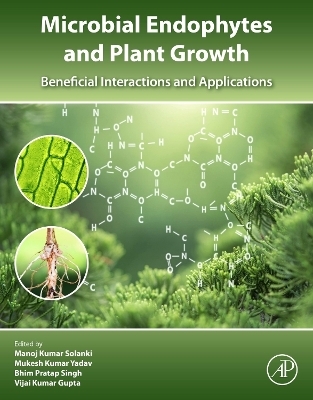
Microbial Endophytes and Plant Growth
Academic Press Inc (Verlag)
978-0-323-90620-3 (ISBN)
This is a one-stop resource for scientists wanting access to the latest research in plant microbiology. The book also provides advanced techniques for using multi-omics approaches to study plant-microbe interactions, providing readers with a practical approach.
Manoj Kumar Solanki is currently employed as a scientist in the Institute of Biology, Biotechnology, and Environment Protection of the Faculty of Natural Sciences at the University of Silesia in Katowice, Poland. In 2006, he received his master’s degree in microbiology from Barkatullah University, and in 2013, he received his Ph.D. in Microbiology from Rani Durgawati University in India. He also served as a research associate in a DBTfunded project at the International Crops Research Institute for the Semi-Arid Tropics (ICRISAT) in India. He received a visiting scientist fellowship from the Guangxi Academy of Agriculture Sciences in China from 2013 to 2015, as well as a visiting scientist fellowship from the Volcani Center, Agricultural Research Organization in Israel from 2016 to 2020. He has been involved in numerous research activities on plants-microbes interaction, soil microbiology, plant disease management, enzymology, and microbial genome analysis during his research career, and has published a number of publications in prestigious peer-reviewed international journals and books. He is also expanding his knowledge of agriculturally significant microorganisms, with a focus on soil and crop health management, among other things as well as worked as associate/guest editor for various journals and has sound expertise in editing books and reviewing articles. Dr. Mukesh Kumar Yadav, is working as an Associate Professor at the Department of Microbiology, Central University of Punjab, Bathinda, Punjab, India. He has more than 15 years of research experience in the field of microbiology in general and microbial biofilms, host-pathogen interaction and endophytes in particular. In his laboratory, Dr. Yadav’s is working on microbial biofilms, antimicrobial resistance, pathogenesis and identification of novel pathways for the development of new antimicrobial/antibiofilm compounds. Dr. Yadav has published more than 74 research articles and received research grants from various funding agencies like, NRF Korea, Indian Council of Medical Research (ICMR), Department of Science and Technology (DST), Department of Biotechnology (DBT) and University Grant Commission (UGC). Dr. Singh is Associate Professor in the Department of Agriculture and Environmental Sciences at National Institute of Food Technology Entrepreneurship & Management (NIFTEM), An Institute of National Importance (INI), under the Ministry of Food Processing Industries, Government of India. Dr. Singh has obtained his Ph.D. from the Department of Biotechnology, Bundelkhand University, Jhansi, India while working in the Indian Agricultural Research Institute-National Bureau of Agriculturally Important Microorganisms (ICAR-NBAIM), Mau, India completed his post graduate training at the National Bureau of Plant Genetic Resources (ICAR-NBPGR), Pusa campus, New Delhi on Genetic Diversity of Barley Landraces by using RAPD markers. Dr. Singh has authored more than 100 research papers and book chapters in journals and books of international repute. Dr. Singh edited six books published by Springer and Elsevier. He is a member of the Association of Microbiologist of India (AMI), the Asian PGPR society for Sustainable Agriculture, the Mushroom Society of India (MSI), and the Indian Science Congress (ISC). He received several prestigious awards from agencies such as DST, New Delhi and other agencies in the field of Microbial Diversity. Dr Singh has served as guest editors in many journals like Frontiers in Microbiology, Biology-MDPI, Journal of Fungi-MDPI, Frontiers in Molecular biosciences etc. His major research areas are in postharvest disease management using natural agents and improving the shelf life of fresh commodities to reduce food loss happening during the food supply chain. Dr. Vijai Kumar Gupta holds a doctoral degree in Microbiology from Dr RML Avadh University, India. Currently, he is working as Senior Fellow and Group Leader at Center for Safe and Improved Foods & Biorefining and Advanced Materials Research Center, SRUC, Edinburgh, UK. Dr Gupta is an expert in Biomass Valorisation, Microbial Engineering Biotechnologies, Enzyme and Bioprocessing Technologies, Bioactive Natural Products, and Functional Microbiome. Overall focus of his research is on developing bioprocess technologies to valorise available bioresources for the production of value-added biochemicals, bioproducts, and fuels and their potential to address the key challenges in agri-food-pharma-environment importance. He has published several peer-reviewed publications, 48 book chapters and 42 books in his hands.
1. Microbial endophytes’ association and application in plant health: an overview
2. Endophytes: a potential bioagent for plant disease management
3. Role of bacterial endophytes in plant stress tolerance: current research and future outlook
4. Endophytic bacteria to control plant viruses: an overview
5. The potential of endophytes to sustain plant performance in a climate change scenario
6. Endophytic microbes from medicinal plants, their antimicrobial potential, and role in green agriculture
7. Mangrove endophytes and their naturalmetabolites: role in promoting plant health
8. Role of fungal endophytes on mycorrhizal-plant association and its impact on plant fitness
9. Postharvest disease management of tomato (Solanum lycopersicum L.) using endophytic actinobacteria as natural biocontrol agent
10. Endophyte mediated plant health via phytohormones and biomolecules
11. Bacterial endophytes as bioinoculant: microbial functions and applications toward sustainable farming
12. Endophytic fungi of the genus Talaromyces and plant health
13. Biogenic synthesis of nanoparticles by amalgamating microbial endophytes: potential environmental applications and future perspectives
14. Beneficial endophytic Trichoderma functions in plant health management
15. Environmental factors and plant16 Endophytic Fusarium and their association with plant growth
17. Microbial endophytes as probiotics for the plant health: an overview
18. Efficacy of microbial endophytes in bioremediation: current research and future outlook
| Erscheinungsdatum | 28.11.2022 |
|---|---|
| Zusatzinfo | 100 illustrations (50 in full color); Illustrations |
| Verlagsort | Oxford |
| Sprache | englisch |
| Maße | 216 x 276 mm |
| Gewicht | 450 g |
| Themenwelt | Naturwissenschaften ► Biologie ► Botanik |
| ISBN-10 | 0-323-90620-6 / 0323906206 |
| ISBN-13 | 978-0-323-90620-3 / 9780323906203 |
| Zustand | Neuware |
| Informationen gemäß Produktsicherheitsverordnung (GPSR) | |
| Haben Sie eine Frage zum Produkt? |
aus dem Bereich


